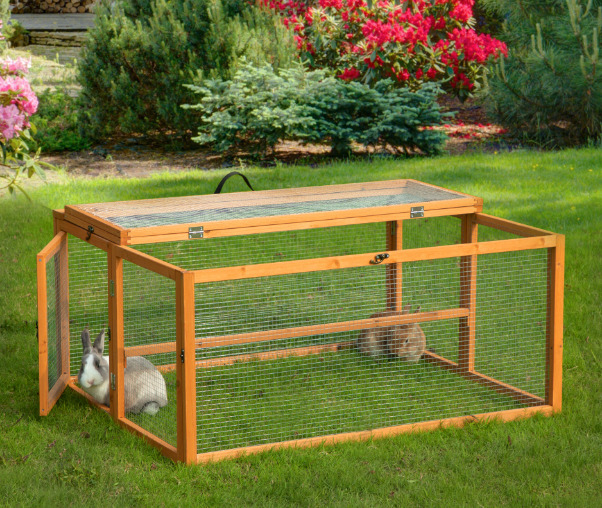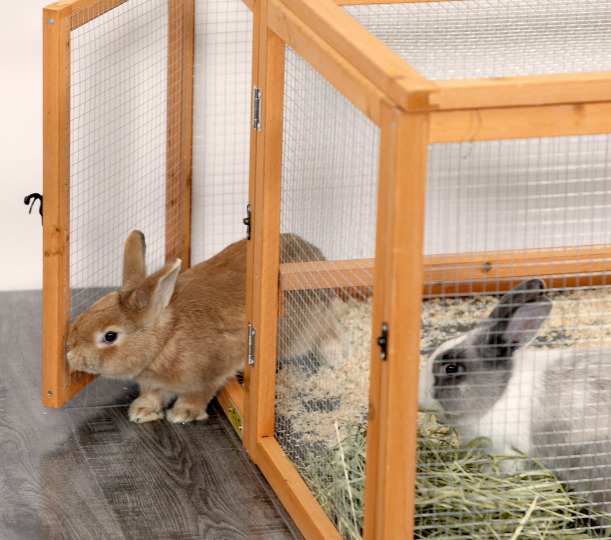Owning a rabbit in rabbit hutch can be an incredibly rewarding experience, filled with fluffy companionship and adorable antics. However, if your normally docile bunny has recently lunged at you, it can be both surprising and concerning. In this blog post, we’ll delve into the various reasons why rabbits may exhibit this behavior and explore ways to understand and address it.
Understanding Rabbit Body Language
Decoding Rabbit Body Language
Rabbits in rabbit hutch, like many animals, communicate through body language. A lunge may be a form of communication, and understanding the context is crucial. It’s essential to recognize the signs leading up to the lunge, such as body posture, ear position, and tail movement. Exploring the nuances of rabbit body language will provide insights into their emotional state and intentions.
Addressing Behavioral Changes
Unspayed or unneutered rabbits in rabbit hutchmay exhibit hormonal influences that contribute to changes in behavior, including lunging. Hormonal behaviors are often more pronounced during mating season. Considering spaying or neutering your rabbit can help manage hormonal influences and promote more consistent and predictable behavior.
Fostering a Safe Space
Rabbits appreciate having retreat areas in rabbit hutches where they can feel secure. Ensure that your rabbit’s living space includes hiding spots or enclosed areas where they can retreat if they feel threatened or stressed. A secure environment contributes to a sense of safety, reducing the likelihood of defensive behaviors like lunging.
Addressing Health and Stress Factors in Rabbit Hutch
Fear and Stress
One common reason for a rabbit to lunge is fear or stress. Rabbits are prey animals, and they may resort to defensive behaviors when they feel threatened. It’s crucial to identify potential triggers, such as sudden movements, loud noises, or unfamiliar scents. Creating a calm and secure rabbit hutch for your bunny can help alleviate stress and reduce the likelihood of defensive lunging.
Health Considerations
Lunging may be a sign that your rabbit is experiencing pain or discomfort in rabbit hutch. Dental issues, arthritis, or other health concerns could contribute to changes in behavior. Regular veterinary check-ups are essential to ensure your rabbit’s well-being. Observing other signs such as changes in eating habits, grooming behavior, or posture can provide valuable clues about their health.
Holistic Approaches
Holistic approaches, such as calming techniques and aromatherapy, can contribute to relaxed and stress-free rabbit hutches for your rabbit. Consider incorporating calming scents like lavender or chamomile, and explore techniques such as gentle massages to promote relaxation. Always ensure that any scents used are rabbit-safe and introduced gradually.

Building Trust and Bonding with Rabbit Hutch
Establishing Trust
Building a strong bond of trust with your rabbit is essential in preventing and addressing lunging behavior. Spend quality time with your bunny, engaging in gentle petting and offering treats. Positive reinforcement with rabbit hutch can go a long way in fostering a sense of security and trust. Avoid sudden movements or loud noises that may startle your rabbit and erode their trust in you.
Rabbit Bonding Techniques
For single rabbits, the desire for companionship may be an underlying factor in lunging behavior. Introducing a new rabbit companion in rabbit hutch, following proper bonding techniques, can provide social interaction and alleviate feelings of loneliness. However, it’s crucial to approach introductions gradually, respecting the unique personalities of each rabbit.
Establishing Boundaries
Rabbits are territorial animals, and territorial aggression can manifest in lunging behavior. This aggression may be directed towards humans or other pets. Understanding the concept of territory in rabbits and establishing clear boundaries within their rabbit hutches can help mitigate territorial aggression. Providing sufficient hiding spots and separate spaces for multiple rabbits can also contribute to a harmonious living environment.
Training and Behavioral Modification in Rabbit Hutch
Training and Enrichment
Rabbits are intelligent and curious creatures that benefit from mental stimulation. Implementing training exercises and providing enrichment activities in rabbit hutches can help channel their energy positively. Puzzle feeders, tunnels, and interactive toys can engage their minds and prevent boredom, reducing the likelihood of unwanted behaviors like lunging.
Positive Reinforcement Training
Implementing positive reinforcement training can be a powerful tool in modifying rabbit behavior. When your rabbit exhibits positive behavior or refrains from lunging without rabbit hutches, reward them with treats, affection, or their favorite toys. This approach helps create positive associations with desired actions and encourages your rabbit to repeat these behaviors.
Professional Guidance
If your rabbit’s lunging behavior persists or if you’re unsure about the underlying causes, seeking professional advice from a rabbit behavior expert or a veterinarian specializing in rabbits is a wise step. These professionals can assess your rabbit’s specific situation in rabbit hutches, provide tailored guidance, and offer recommendations for managing or modifying behavior effectively.

Holistic Approaches and Environmental Considerations
Social Dynamics
Rabbits are social animals that thrive on companionship. If you have multiple rabbits in rabbit hutches, lunge behavior might be related to social dynamics within their group. Observing how rabbits interact with each other can provide insights into their relationships. Introducing new rabbits gradually and ensuring they have ample space and resources can contribute to a more harmonious group dynamic.
Respecting Personal Space
Improper handling or attempting to pick up a rabbit when they are not comfortable can lead to defensive behaviors like lunging. It’s crucial to respect your rabbit’s personal space with rabbit hutch and learn proper handling techniques. Gradually acclimate your rabbit to being handled, offering treats and positive reinforcement to create a positive association with human interaction.
Environmental Enrichment
Enriching your rabbit hutches is essential for their mental well-being. Consider adding hiding spots, tunnels, and platforms to their living space. Additionally, rotating toys regularly and providing safe items for them to chew on can prevent boredom and redirect their energy toward positive activities. A stimulated rabbit is less likely to exhibit undesired behaviors.